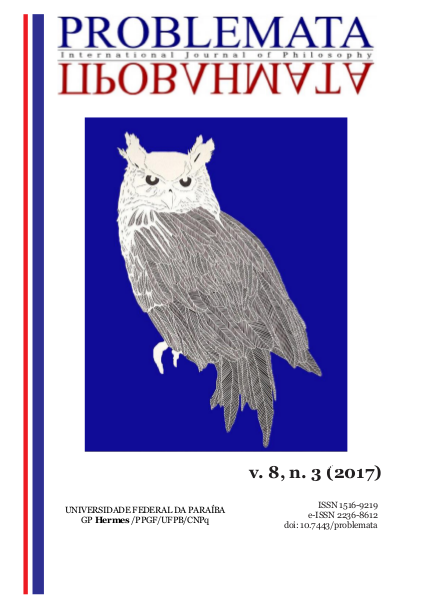AS CRÍTICAS DE HABERMAS AO PROJETO KANTIANO DE PAZ
DOI:
https://doi.org/10.7443/problemata.v8i3.34060Keywords:
Habermas, Kant, paz, guerra, cosmopolitismoAbstract
Habermas apresenta vários argumentos normativos que justificam a necessidade de uma reconstrução do cosmopolitismo kantiano: Kant desenvolveu um conceito negativo de paz, as alterações do projeto resultando em um cosmopolitismo fraco compatível com a soberania estatal, as concessões ao realismo político da razão de estado, a impossibilidade de conciliar a soberania estatal com os direitos humanos; além dos argumentos históricos que mostram como as condições que Kant considerou que fomentariam o cosmopolitismo (o pacifismo das repúblicas, do comércio internacional e a formação de uma opinião pública pacifista) sofreram uma espécie de dialética na medida em que, se em um primeiro momento, foram negadas pela evolução histórica, em um segundo momento, se realizaram parcialmente.
Downloads
References
Aramayo, R. (org). La paz y el ideal cosmopolita de la Ilustración: a propósito del bicentenario de “Hacia la paz perpetua” de Kant. Madrid: Tecnos, 1996
BENHABIB, S. Kosmopolitismus und Demokratie: Von Kant zu Habermas. Goethe-Institut e. V., Fikrun wa Fann, Juni 2012. Disponível em: <http://www.goethe.de/ges/phi/prj/ffs/the/a97/de9507770.htm>. Acesso em 28 de fev. 2017.
BOHMAN, J. & LUTZ-BACHMANN, M. Perpetual peace: essay on Kant’s cosmopolitism ideal. Massachusetts: The MIT Press, 1997.
CONTRERAS PELÁEZ, F. C. Kant y la guerra: una revisión de la Paz Perpetua desde las preguntas actuales. Valencia: Tirant lo Blanch, 2007.
FINE, R. & SMITH, W. Jürgen Habermas’s Theory of Cosmopolitanism. Constellations, 10(4):469-487, 2003.
—Kantian cosmopolitanism today: John Rawls and Jürgen Habermas on Immanuel Kant’s foedus pacificum. The King‘s College Law Journal 15: 5-22, 2004.
HABERMAS, J. Strukturwandel der Öffentlichkeit. 4.Aufl., Frankfurt am Main, Suhrkamp Verlag, 1995.
—Die Einbeziehung des Anderen. Studien zur politischen Theorie. 2.Aufl., Frankfurt am Main, Suhrkamp Verlag, 1997.
HELD, D. Democracy and the Global Order. Stanford: Stanford University Press, 1995.
KANT, I. Kants Gesammelte Schriften. Hrsg. von der Königlichen Preussischen, bzw. von der Deutschen Akademie der Wissenschaften. Berlin: Walter de Gruyter, 1902 ss.
—Immanuel Kants Werke. Herausgegeben von Ernest Cassirer, Berlin, Bruno Cassirer, 11 v., 1922.
KLEINGELD, P. Kant’s Cosmopolitan Patriotism. Kant-Studien 94: 299–316, Walter de Gruyter, 2003.
KLENNER, H. Kants Entwurf "Zurn ewigen Frieden" - Illusion oder Utopie? Archiv für Rechts- und Sozialphilosophie, 2: 151-160, 1996.
MERTENS, T. “Cosmopolitanism and citizenship: Kant against Habermas”, European Journal of Philosophy, 4 (1996), 328–47.
MORI, M. La pace e la ragione. Kant e le relazioni internazionali: diritto, politica e storia. Bologna: Il Mulino, 2008.
ROUSSEAU, J-J. Projet de constitution pour la Corse. La gaya scienza, 2012.
SCHMITT, C. Der Begriff des Politischen. Duncker und Hunblod: Berlin, 1979.
SCRIVENER, M. The Cosmopolitan Ideal in the Age of Revolution and Reaction, 1776–1832. New York: Pickering and Chatto, 2007.
VELASCO ARROYO, J. C. Ayer y hoy del cosmopolitismo kantiano. Madrid: Isegoría,16: 91-117, 1997.
Downloads
Published
Issue
Section
License
Authors who publish with this journal agree to the following terms:
- Authors retain copyright and grant the journal right of first publication with the work simultaneously licensed under a Creative Commons Attribution License that allows others to share the work with an acknowledgement of the work's authorship and initial publication in this journal.
- Authors are able to enter into separate, additional contractual arrangements for the non-exclusive distribution of the journal's published version of the work (e.g., post it to an institutional repository or publish it in a book), with an acknowledgement of its initial publication in this journal.
-
- Authors are permitted and encouraged to post their work online (e.g., in institutional repositories or on their website) prior to and during the submission process, as it can lead to productive exchanges, as well as earlier and greater citation of published work (See The Effect of Open Access).





